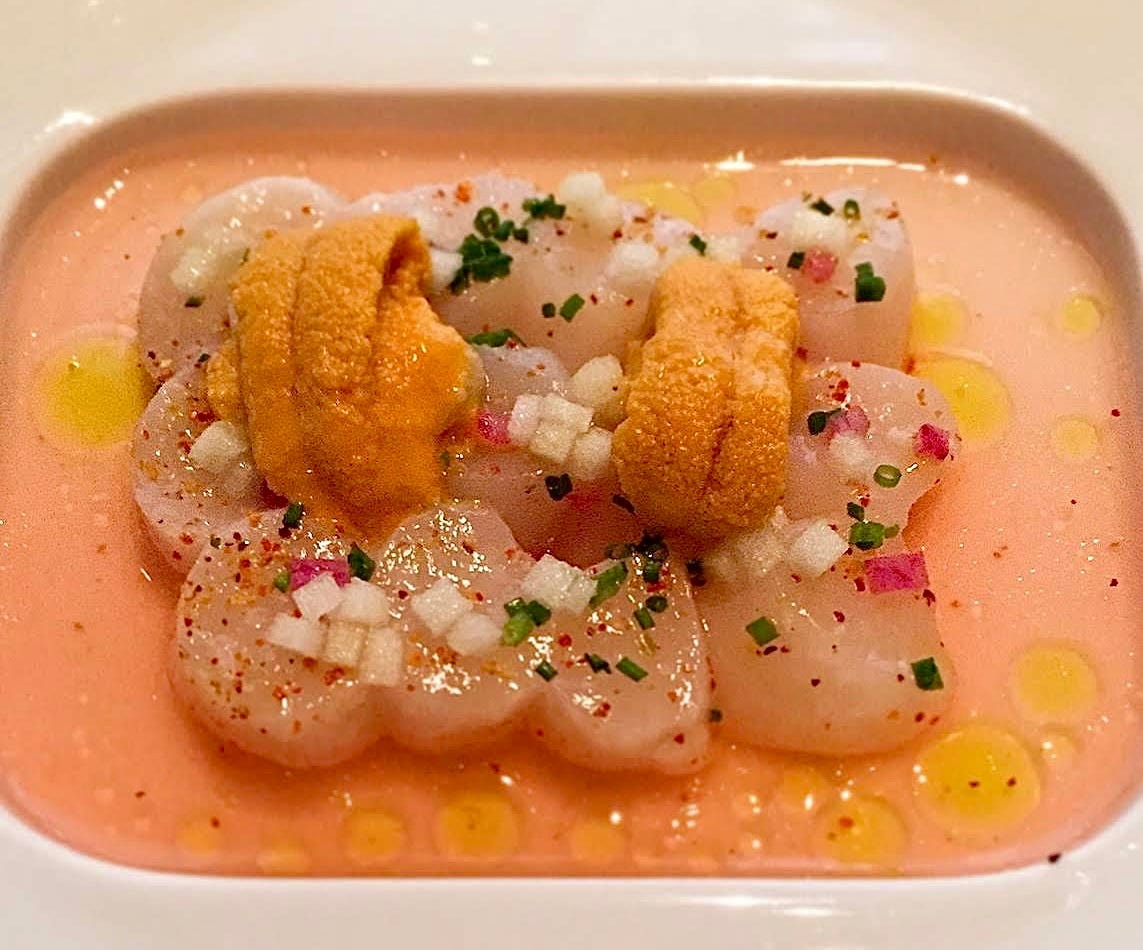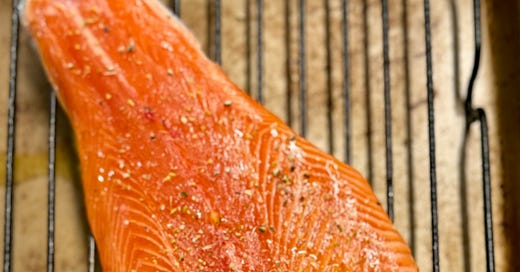“I think the search for perfection is very interesting. Everybody should be searching for perfection, knowing that perfection doesn’t exist; we will never attain perfection. But the exercise is about making something better than it was yesterday and will be tomorrow.”
—Chef Eric Ripert, in conversation with Chris Nuttall-Smith
New York is that miracle of a place – so many not just good but really great restaurants that your head can spin trying to decide where to eat. My favourite, one that I have been privileged to dine at more than once, is Le Bernardin.
The restaurant is tucked away on 51st Street between 6th and 7th, the sign subtle, easy to walk by and miss. Once inside, however, the atmosphere could not be more welcoming. Le Bernardin is a soothing, beautiful clubby space with old school glamour and sophisticated details. Gleaming wood in a rich coffered ceiling, a silvery wall lit from below that has the shimmery effect of gently lapping waves, artfully arranged cherry blossoms towering over delicate orchids, all exuding a Zen-like calm and a measured cadence.
Chef Eric Ripert, he of the silver hair and dazzling smile, has been at the helm of Le Bernardin since the age of 28. Since its first review in 1986, the New York Times has given the restaurant four stars, an honour it has maintained in the ensuing years.
Here, seafood is the star. Subtlety shapes every dish, delicate flesh translucent and raw, or perfectly cooked with a restrained sauce that lets the sea shine through. It feels like perfection, attained.

Does fine dining even matter?
What if all the exacting, creative, quality-obsessed restaurants did go away? We’d lose more than fancy meals for rich people.
—Pete Wells, New York Times restaurant critic, in his review of Le Bernardin
When one dines at a “fancy” restaurant, expectations are high. You are paying top dollar for one meal, a singular experience, a moment in time that will only exist in your memory beyond tonight.
We saw Ripert in conversation this week with Toronto-based food writer Chris Nuttall-Smith talking about his new book, his ideas about hospitality, the notion of fine dining and the ideas that inspire him still.
Ripert described the fine dining experience like this:
Fine dining is something very special. It’s supporting excellence in every aspect. The goal is to create an experience for the guest that is absolutely unique, from the beginning when you pick up the phone and call to the last second when you leave the restaurant. Everybody wants you to have an amazing experience.
We care about sustainability. We buy the best products from the local farmers, from the local fishermen. When we buy scallops, our scallops are scuba dived. A bunch of guys in Maine go into the water and get the scallops one by one. Regular scallops are obtained with a boat that drags the bottom of the ocean and destroys everything in its wake. We support the arts and artisans. Our wine glasses come from Austria, hand blown by artisans who have been blowing glass the same ways for hundreds of years. Our plates are made in a small town in France that has been producing porcelain since 1771. The products are beautiful, because so much work goes into each plate, each saucer, each bowl.
We carry the tradition of hospitality and cooking and we train our cooks and the waiters and every employee with the best techniques that they would never learn somewhere else. Most importantly we have zero zero zero tolerance for any misbehavior.
When all the pistons are firing, it is very special indeed. At such times the moment crystallises and becomes perfect, a memory captured that is fleeting but never forgotten. Words become irrelevant when the gift of a great food experience is this good.
What if a master chef could teach us to cook beautiful seafood simply at home?
Making simple easy
“It took me all my life to learn how to salt a tomato.”
—Chef Eric Ripert
Fine dining is one thing. Being a home cook is another, more pressing task, often complicated by our own desires to make something wonderful without exactly the knowledge or time to do so simply.
Ripert’s latest cookbook, Seafood Simple, delivers on the promise of simple. Ripert eschews complexity to honour seafood in its purest form. Few ingredients. Straightforward directions. And best of all, loads of techniques and tips that aim to instruct and teach so that the failure of overcooked fish, so common an occurrence, is avoided.
And if there’s one thing about seafood that Ripert knows, beyond how to cook it to perfection, is that it can often be the most intimidating thing for the home cook to tackle.
Ripert spoke to Matt Galloway at CBC Radio about the inspiration for the book:
You have to be cautious in the way you handle fish and we teach you how to do it. And then it's so delicate and so complex in flavours that the more you put on your plate, the more you're going to lose the essence of the fish. If the fish is the star of the plate and you start to think about presentations and colours and putting a ton of vegetables and adding spices and different sauce and make it super complicated on top of it, you're going to overcook your fish so the fish will be tasteless and dry. And then with all those ingredients in a plate, you will forget that it's a seafood dish.
From a smoked salmon croque monsieur, to shrimp boil, crab gratin and even fish fingers with ketchup, the recipes are written so that the fish shines—and you do too.
The comfort of cooking
At the tail end of a week that has flattening us with the weight of human suffering, maybe you’re heading into the kitchen to bring the people you love together and serve them food.
Keep it simple. As Ripert says, “You cannot prove scientifically that love makes a difference in the food. But I am convinced that you can feel it.”
Spread joy and love. Cook something. Whether simple or complicated, the love you add to the ingredient list will shine through.
A simple rainbow trout
serves 2
This is not a recipe form Ripert’s new book. Fresh on my shelf, I’ll be diving into it more fully in the weeks ahead. Rather, it’s the way I’ve been cooking a fresh fillet of rainbow trout for years.
It starts, of course, with the freshest of fish, purchased at a reputable fishmonger (Ripert gives great tips for how to determine both in his book). Cook it the day you buy it, or at least within 24 hours.
Serve it with seasonal vegetables, simply prepared (Ripert’s other book. Vegetable Simple, has some ideas for you too). Eat it with someone you love. Simple and delicious.
Ingredients
1 skin on rainbow trout fish fillet, about 1 pound
Kosher salt and white or black pepper
Olive oil
Fennel pollen, optional
Heat the oven to 425F. Pat the fillet dry. Season lightly with salt and pepper on both sides. Place the fillet on a small baking sheet with a wire rack to elevate the fish. Season with a small sprinkle of fennel pollen, if using. Drizzle very lightly with olive oil.
Cook the fish for 10 to 15 minutes, checking for doneness after 10 minutes. To test, place a fork at an angle, at the thickest point, and twist gently. If the fish flakes easily, it's done.






I am sorry I missed hearing Ripert. I didn’t even know he was in town?! Thx for sharing.